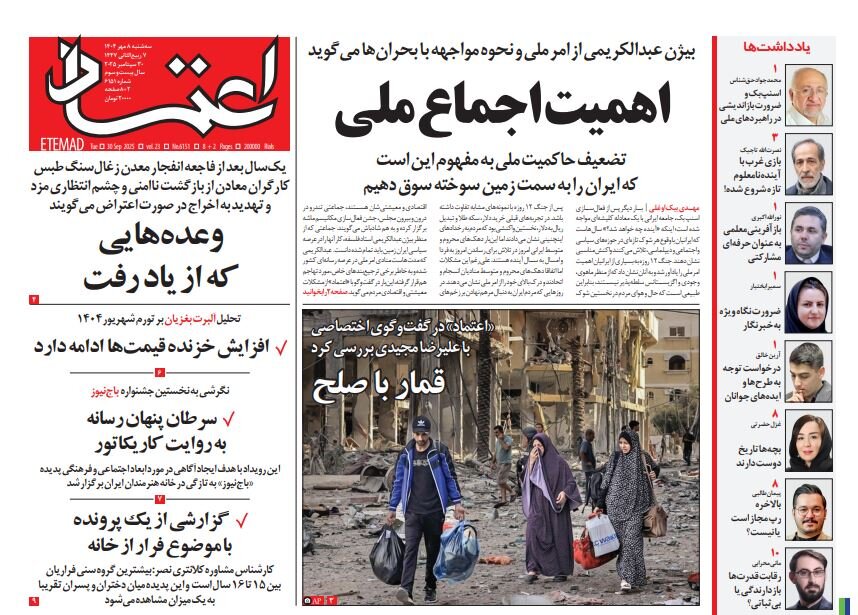Europe will have no role in Iran’s future calculations

TEHRAN - In an interview with Etemad, Ahmad Shirzad, an expert on international affairs, says Europe will not have a role in Iran’s nuclear issue in the future.
Shirzad said: Today, the situation has changed. Despite all the distrust, hostile behavior, and unilateralism of the United States, it is at least clear that the main party in the nuclear case is Washington, and negotiations through the Europeans are basically useless. As Mr. Araghchi underscored, future decisions on this issue will effectively exclude Europe from playing any meaningful role. Therefore, dialogue and agreement with the main party, that is, America, will be much more fruitful than relying on European mediation. On the other hand, we should not forget that Europe’s weight in this case is very low, and at some points, they have even played a destructive role. The role of the Europeans in recent years regarding the Iranian nuclear issue has not been positive or had a significant impact. Accordingly, Iran will likely have neither special interaction nor consultation with Europe in the future.
Hamshahri: Weakening sanctions pressure
Hamshahri wrote: With the activation of the snapback mechanism (by the European troika of Britain, France and Germany), the UN sanctions against Iran have been re-imposed. The main question now is whether these sanctions can stop Iran’s nuclear program or will they simply increase diplomatic and economic pressure. It must be said that political consensus is the first condition for effectiveness. Whenever Russia or China opposes drastic measures or there is a possibility of vetoing resolutions, the effectiveness of the sanctions and the decisions of the Security Council will be weakened. The implementation of the sanctions requires monitoring capacities and technical-legal cooperation of third countries to prevent evasion of the sanctions. Countries that wish to avoid it can resort to alternative tools and paths. Ultimately, the reality is that Chapter 7 pressures and unilateral actions can bring the other side back to the negotiating table, but the sustainability of any agreement requires structural and political guarantees.
Kayhan: Israel concerned about rising Tehran-Beijing ties
In a note, Kayhan dealt with the intensification of concerns about the increase in relations between Iran and its allies following the return of sanctions. The paper said: In recent years, China has become one of the most influential powers in the world and has expanded its influence in global economy, technology, and security. Now, Beijing's harsh tone and alignment with Iran are an issue that has increased the differences between Tel Aviv and Beijing. China's relations with Iran have become a major cause for concern for Israel because Beijing accounts for 91 percent of Iran's oil exports. This issue has also intensified the pessimism of the United States and Europe about the effectiveness of sanctions against Iran. The expansion of economic and military cooperation between China and Iran has become a matter of concern for Israel. China has close relations with Iran, and in recent years, it has deepened these relations by signing strategic and military agreements with Tehran. Joint naval drills between Iran, China and Russia are an example. Cooperation between Tehran and Beijing has changed the balance of power in the region to the detriment of the Tel Aviv regime.
Sobh-e-No: We must know the deceitful enemy well
Sobh-e-No wrote: Despite the agreement between Iran and the IAEA in Cairo that met the requests of the European side, the European trio of Britain, France and Germany activated the snapback mechanism. And now, with the return of sanctions, they are talking about diplomacy and say they are ready for dialogue with Iran. In such circumstances, negotiation and conversation lose their effectiveness, and the meaning of the Leader of the Revolution’s remarks that “negotiation is a complete deadlock” becomes more evident. Now, instead of finding about the intention of the West, some political disputes have intensified at home. The lesson that can be learned from this agreement is to find about the “nature” of the enemy, which we must pay attention to in decision-making and policy-making, so that we do not fall prey to their trap again. Tehran’s nuclear diplomacy has always been based on negotiation, interaction, and trust-building. From the intensive negotiations that produced the JCPOA to recent contacts with Europe, the International Atomic Energy Agency, and even with the United States, all indicate that Tehran has always sought a political solution. It is important to understand the “nature” of the other side so that we do not have a simplistic view of the other side, do not take anyone's signature as a guarantee, and do not be deceived by the other side's ploys through negotiations.
Leave a Comment